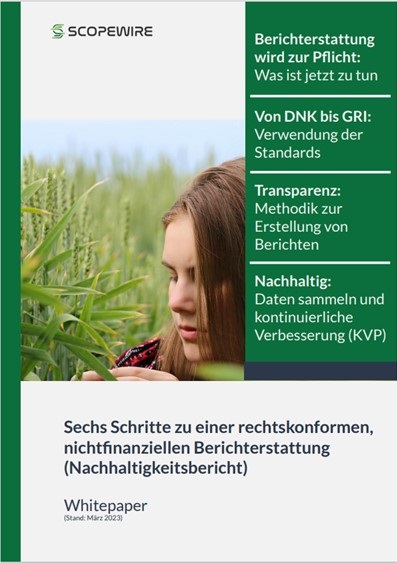Scopewire Sustainability
Scopewire SustainabilityFrom workshops to sustainability reports - we offer holistic solutions.
Scopewire Sustainability
The new goal of climate policy is climate neutrality. Many companies are already testing innovative processes and have launched pilot projects to develop climate-neutral business models and products. At their production sites and in the upstream and downstream value chains, they pursue sector-specific strategies and are already reducing their emissions.
Recently, the reporting obligation for companies based on the CSRD was postponed by one year to 2024. This now gives you the opportunity to prepare for the topic of sustainability in your company with a long-term strategy and to plan your employee capacities accordingly.
We have set ourselves the goal to become the most important international cloud provider for LkSG, energy monitoring and sustainability reporting. In keeping with our goal, we will support our customers to securely prepare and track their sustainability goals in the relevant areas with an appropriate database and to report them cleanly to official institutions.
Which factors are particularly important for the sustainability of your company and why? The acronym ESG stands for Environment, Social and Governance, and this fare more than just reducing CO2 emissions and greenwashing. Here we inform you about the most important aspects of environmentally conscious and socially responsible corporate management.
Environment

Climate protection
- Emissions
- Adapting to climate change
Natural resources
- Biological diversity and ecological systems
- Water and martime resources
Environmental pollution
- Resources and cyclic economy
- Energy
Social

Respect of human rights
Working conditions
- Production and occupational safety
- Diversity and equal opportunity
- Pay equity and work-life balance
Product
- Product qulaity and safety
- Product liability and responsibility
Data protection and data security
Governance

Corporate management
- Roles, compositions and compensation of top management
- Internal control and risk management systems
Corporate conduct
- Corporate ethics
- Anti-corruption
- Free competition
- Sustainable Finance
Stakeholder management
- Business partner relations
- Social dialogue
- Political dialogue
Corporate Sustainability Reporting Directive (CSRD)
Based on the European Union’s Corporate Sustainability Reporting Directive (CSRD), there will be a sustainability reporting obligation in the future for all companies listed on the stock exchange (with the exception of micro-enterprises) and for companies that meet two of these three criteria:
250 employees
40 Mio. € revenue
20 Mio. € balance sheet total
The sustainability reporting obligation is relevant for around 15,000 companies in Germany, and for companies subject to NFRD it will come into force retroactively for the 2024 financial year on January 1, 2025. But those are only the legal aspects. In addition, we will be happy to advise you in a personal meeting on how important sustainability has become for investors, customers and employees and how you can contribute significantly to the success of your company through consistent implementation.
Even companies that do not meet the above criteria and therefore do not have a sustainability reporting obligation firmly integrate corporate sustainability into their value system – if not the entire founding idea is based on the topic of sustainability. Becaise there are:
Other economic reasons for businesses,
to deal with the issue of sustainability.
Employee
According to a StepStone survey, 76% of employees in Germany think that sustainability is a high priority for their employer. Another 47% said they would specifically look for jobs at sustainable companies if they changed jobs. (Source: Haufe, Sustainable employers are more attractive, 2022)
Supply chains
Manufacturers force their suppliers and distribution channels to disclose their sustainability activities. Many companies are already thinking about an S rating (sustainability rating). In the worst case, failure to meet the required criteria may even result in termination of the business relationship. Analogies can be drawn to an ISO 9000ff quality management certification or a compliance declaration.

Investors
According to an EY study, 90% of institutional investors are increasingly including sustainability criteria in their investment decisions since the COVID 19 pandemic. (Source: EY, study: IS your ESG data unlocking long term value, 2022)
Customers
The result of a McKinsey study found that in, during and after the pandemic, 78% of consumers look for sustainable products when shopping and 51% of respondents are willing to spend more money on sustainable products. (Source: McKinsey, PM sustainable consumption, 2022)
How can we support you:
With Sopewire Sustainability, we offer you a holistic approach to familiarize yourself with this topic and to have a sustainability report available at the end with the solution that suits you best. Throughout the entire process, we are at your side as your personal partner. With our solution, we enable you to meet future regulatory requirements, create additional competitive advantages and minimize business risks. Sustainable corporate management and growth can thus also work hand in hand.
Use sustainability goals as added value and integrate them directly into your corporate strategy.
Data that has already been collected can be included for future decisions. With our technical cloud solutions, you can effectively integrate data collection and capture processes into your business operations. This gives us a competitive edge and minimizes business risks. It is important to then take advantage of these benefits once you have achieved your sustainability goals. Business partners and customers should know this. This will enhance your reputation and enable you to tap into new market and customer segments.
Transparency – six steps to a report
With method to sustainability report
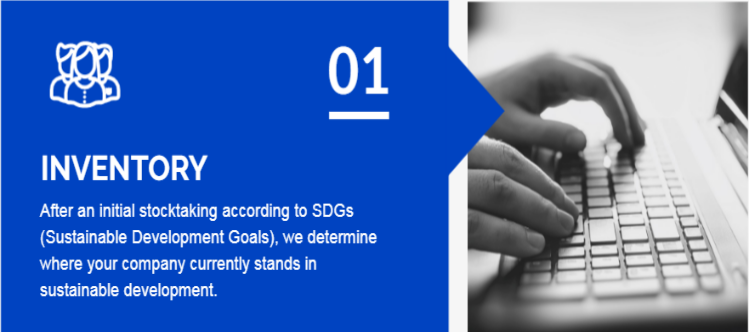
After an initial CSR inventory in accordance with the SDGs (Sustainable Development Goals), we work with you to determine where your company currently stands in terms of sustainable development. Together with you, we determine the standards according to which you want to report in the future. The preparation of legally compliant non-financial reports is the responsibility of company managers and board members, which means that this project is to be implemented under the auspices of the respective management. Sustainable management becomes an integral part of the company’s business strategy.
In this project step we work out with you:
- the selection of the appropriate reporting standard for your company
- the material issues (cf. double materiality) for your company
- a basic potential for improvement through a GAP Assessment (gap analysis)
- a recommendation for the improvement of future processes and concrete measures
- a project plan and define the steering committee and the project team
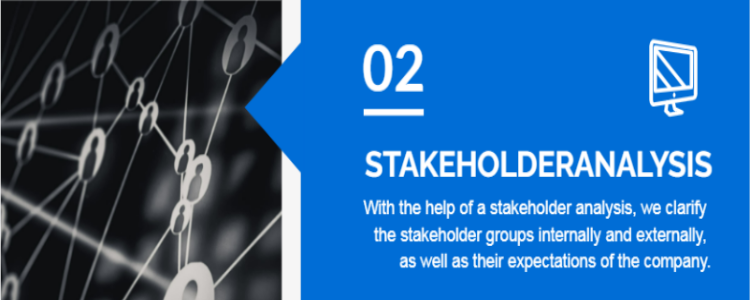
Stakeholder analysis is one of the key success factors for sustainability projects. With the help of a stakeholder analysis, we clarify with your project team which stakeholder groups exist and their possible expectations of the company. Every company has a whole network of employees, stakeholders, customers, suppliers, associations, media, politics, etc. that need to be taken into account. Possible stakeholders must therefore be sought internally, but also externally. The stakeholder analysis is used to determine and document which relevant topics are of interest to individual stakeholders and how requirements can be implemented in terms of processes, if necessary (see, among other things, from the Supply Chain Duty of Care Act – LkSG). The aim is therefore to address the information needs of stakeholders in advance via future sustainability reporting in order to create mutual trust, acceptance and a good working atmosphere.
Stakeholder analysis is mandatory under the EU Corporate Sustainability Reporting Directive (CSRD) and the GRI’s (Global Reporting Initiative) standard.
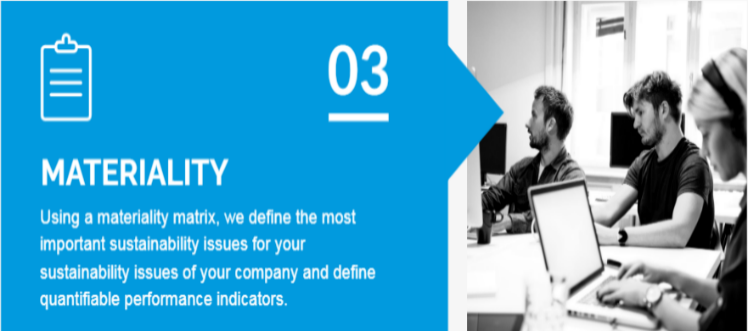
Using a materiality matrix, we define your company’s most important sustainability issues. The range of topics is very large and complex. The principle of materiality analysis states that a company defines its own focus on the most important issues that have a high significance and impact, e.g. on the environment, society and not least for the company. Using the “Materiality Disclosures Service” (the industry-specific materiality matrix), we work with you to develop the individual industry-specific additional information, in accordance with the GRI guidelines, for example, that is relevant to your company or organization and individually tailored to your business model.
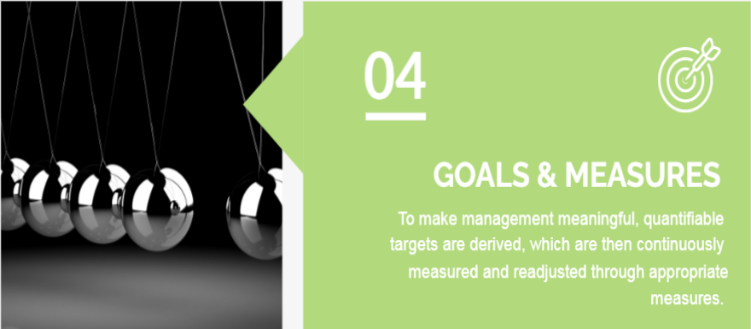
The management or the executive board is responsible for the topic of sustainability. Meaningful performance indicators are determined and measured on an ongoing basis to manage sustainability issues. The establishment of processes that are intended to focus on a company’s sustainability aim in the medium term to ensure that, for example, energy efficiency is improved, emissions are reduced and more resource-efficient production methods are introduced. To ensure and document the sustainable development of your company in the long term, quantifiable targets are defined and backed up with measures. This is where our BIXpert solution comes in. BIXpert gives you the opportunity to use standard templates (e.g. GRI Standard 2021), to automate recurring processes and to minimize personnel expenses by digitizing reporting processes. We introduce the necessary tools (dashboards, regular key figures for management) to keep an eye on the goals and have a control instrument. Use the data you have obtained for the sustainability report as additional data points for your decisions. Integrate the processes for obtaining sustainability data directly into your business processes to make them even more efficient.
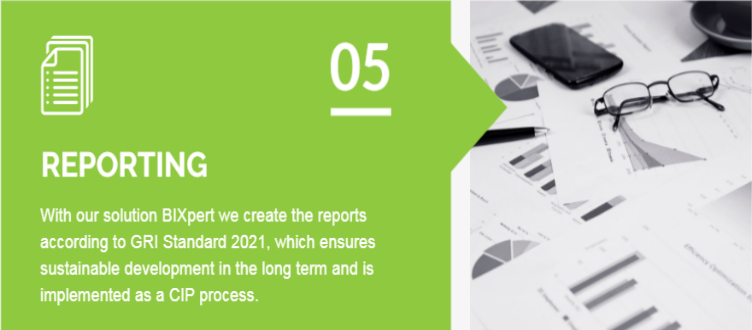
Reporting is the essential preliminary step. Of course, the report can be created manually, but this reporting process is a continuous and annual process. The legislator continuously adjusts the standards. Especially as an internationally operating company: use every opportunity to automate reporting processes. BIXpert provides you with the necessary structures and templates to facilitate your individual sustainability reporting and minimize manual efforts. Each stakeholder should be served accordingly with the information relevant to them (i.e. a works council has different information requirements than a public authority or organization, which in turn differs from the requirements of shareholders or investors). Starting from the standard, we offer the appropriate individuality with our solutions.
The reporting standard we use according to GRI Standard 2021 is internationally valid and machine-readable. We offer the reports currently in English and German. We will be happy to inform you about the implementation of other languages.
Reporting is therefore the first step towards comprehensive sustainability management and sustainable corporate governance.
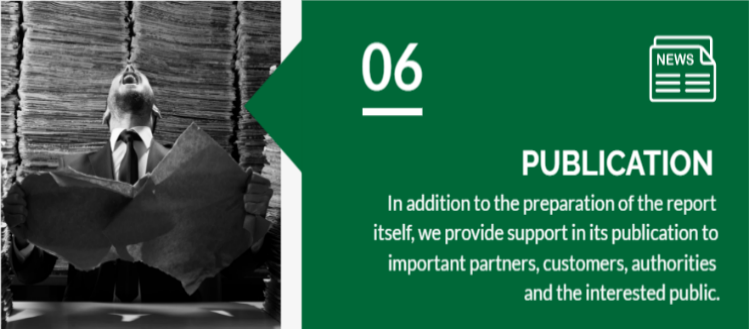
In addition to the final preparation of the sustainability report, we also take care of its publication and dissemination to important partners, customers and the interested public, as well as to the organizations (GRI, DNK) and the authorities.
We already support you in planning and implementing sustainability reporting.
